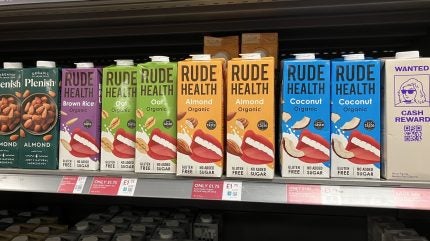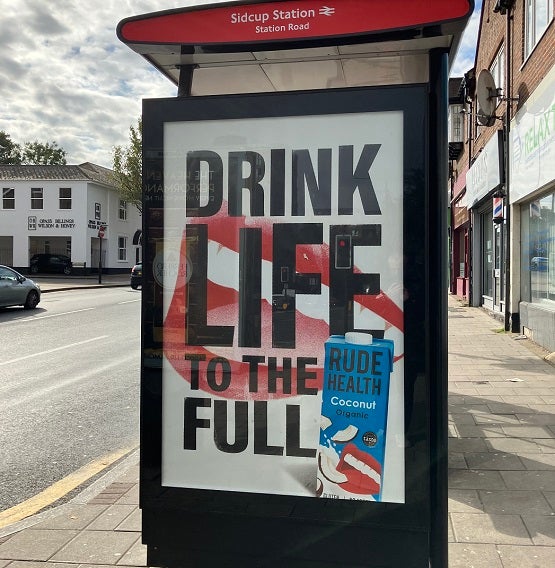

With Britvic (soon to be Carlsberg?) behind Plenish and AG Barr backing Moma, Rude Health has become the latest UK alt-milk brand to sell up.
This week, Oddlygood, the plant-based dairy company majority-owned by Finnish dairy giant Valio, added Rude Health to its portfolio, snapping up the London-based business from its founders.
Oddlygood’s latest move in the UK is by far its biggest. The company launched plant-based puddings in the country 12 months ago and its own alt-milks earlier this year. However, the deal for Rude Health comes at a time when the UK’s plant-based milk market has lost momentum.
According to Rude Health co-founder Camilla Barnard, the company itself has been enjoying growth in recent months but the wider category has seen sales slow and promotions have become a regular fixture on retail shelves as brands battle for custom.
And Barnard, who set up Rude Health almost 20 years ago, believes brands need to work hard to win over more consumers.
When Oddlygood announced the deal on Tuesday, there was perhaps an acknowledgment from the company itself that the UK plant-based milk market is in less than rude health.
Access the most comprehensive Company Profiles
on the market, powered by GlobalData. Save hours of research. Gain competitive edge.

Company Profile – free
sample
Your download email will arrive shortly
We are confident about the
unique
quality of our Company Profiles. However, we want you to make the most
beneficial
decision for your business, so we offer a free sample that you can download by
submitting the below form
By GlobalData
Describing the UK as a “key territory” for the business, Oddlygood nonetheless said it was “aiming to reinvigorate the UK’s competitive plant-based drinks category”.
“The UK market is notoriously competitive with established leaders but we believe that bringing these brands and teams together will reinvigorate the market and re-engage both new and existing users of plant-based products,” Oddlygood CEO Niko Vuorenmaa said.
“Rude Health is one of the biggest success stories in British plant-based food. It’s nothing less than impressive the way the team has grown its product range alongside such a distinctive and well-thought-of brand to deliver commercial success.”
Rude Health describes itself as a “top-five UK plant-based drinks brand”. The company, which also markets cereal and snacks, says it is set for a record year of revenue, on track to hit £28m ($36.2m).
Speaking to Just Food earlier this month, Barnard said Rude Health’s plant-based milks, which she said are “the core focus”, had been growing revenue and volumes but were doing so in a UK plant-based milk market she described as “mature, relatively flat and very competitive”.
“The growth is driven by a few challenger brands, including us,” Barnard said.
“You’ve got a relatively flat category and you’ve got a bit of a squeeze still on people’s incomes, I think the choice becomes more conscious. ‘Why am I choosing to buy into this category? What am I getting?’ The growth is coming from challenger brands who are offering something clear and specific. In our case, I think it’s healthier and it still tastes good.”
Despite the category being flat in an overall UK grocery market facing cost-conscious consumers, Barnard said she believed plant-based milk could continue to grow. However, she argued the category was facing a new stage in its development where it needed to work harder to win over new consumers, particularly by pushing the environmental credentials of products.
“I think at a macro level, maybe not tomorrow, but I still think there is definitely growth. I think what we’ve had is the early easy bit. The people who would always have bought it if it had tasted nice and if the ingredients have been good, and if it were readily available,” Barnard said. “Now it’s a question of people who are probably meat-eaters, flexitarians.”
Those shoppers are, Barnard explained, going to “testing all kinds of things” and only some products “will stick”. She added: “I feel dairy alternatives will grow because it’s a relatively easy environmental argument and a sustainability argument and that’s something that we Rude Health need to do better at talking about.”
Rude Health has invested in above-the-line advertising this year, with spending on a visible out-of-home campaign, not least in Just Food’s corner of south-east London.

Barnard said it’s the first time they’ve invested in such a way. “Phase one is pure awareness but what we want to do, what we want to build, is then more understanding of what we do,” she said. “The whole environmental piece is we’re incredibly strong on that. It’s a message that the consumer doesn’t really know. That is part of how we’re going to stand out. And then the drinks, hopefully, will deliver the taste message, but we need to communicate better the ‘why’.”
It’ll be interesting to see if the brand’s strategy continues along this path under Oddlygood’s ownership. In the statement announcing the deal, Barnard said: “Now is the right time to find a partner who can help take it to the next stage of success and Oddlygood shares so many values and the ambition to make this possible.”
Rude Health CEO Tim Smith added: “Joining forces with Oddlygood opens up new opportunities for growth and innovation, and our shared missions around taste, quality and the crucial role of plant-based food and drink make this a natural fit. We’re looking forward to working together and leveraging our strengths and making the healthy choice a celebration (not a sacrifice) for our customers. It’s an exciting new chapter for the brand and the team.”
One strength the enlarged business might be able to leverage is investment in promotions. Visiting stores in one corner of the UK capital shows how often plant-based milk brands invest in discounts, including through the loyalty-card schemes of the country’s major retailers.
Barnard says the current “tight” number of brands in the category means there isn’t “an immediate danger”. She also credits Danone and Alpro for pushing through a price increase, a move that “is establishing a price point for the category which stops it sort of becoming massively discount-driven”. It also, perhaps, helps close the price gap between a brand the size of Alpro and the clutch of smaller brands on the next rung down, which includes Rude Health.
In last month’s interview, Just Food asked Barnard if she had plans to exit (PepsiCo acquired a stake in Rude Health five years ago). She suggested Rude Health might “at some point need to be probably part of something a bit bigger that can help it” grow further.
“Getting to that sort of £30m turnover point — you’ve then got to look at, how do you get to £50m and £100m. It may well be that it needs to be part of something bigger that,” Barnard said. “It would have to be — it’s going to be something bigger that is going to nurture as it is and not going to try and transform it into something that it isn’t and lose its entire meaning.
“It would be a considered choice but I think probably it will need to have new ownership at some stage that can do that for it, that can do that next stage.”
Were any live talks going on, we asked? “There’s always discussions,” she said. “There’s always stuff happening. It’s constantly – there’s, you know, people approaching or talking or asking. There is always stuff going on.”
Four weeks later, a deal was unveiled and the strangely named Oddlygood continued its quest to build a presence in alt-milk across Europe.
